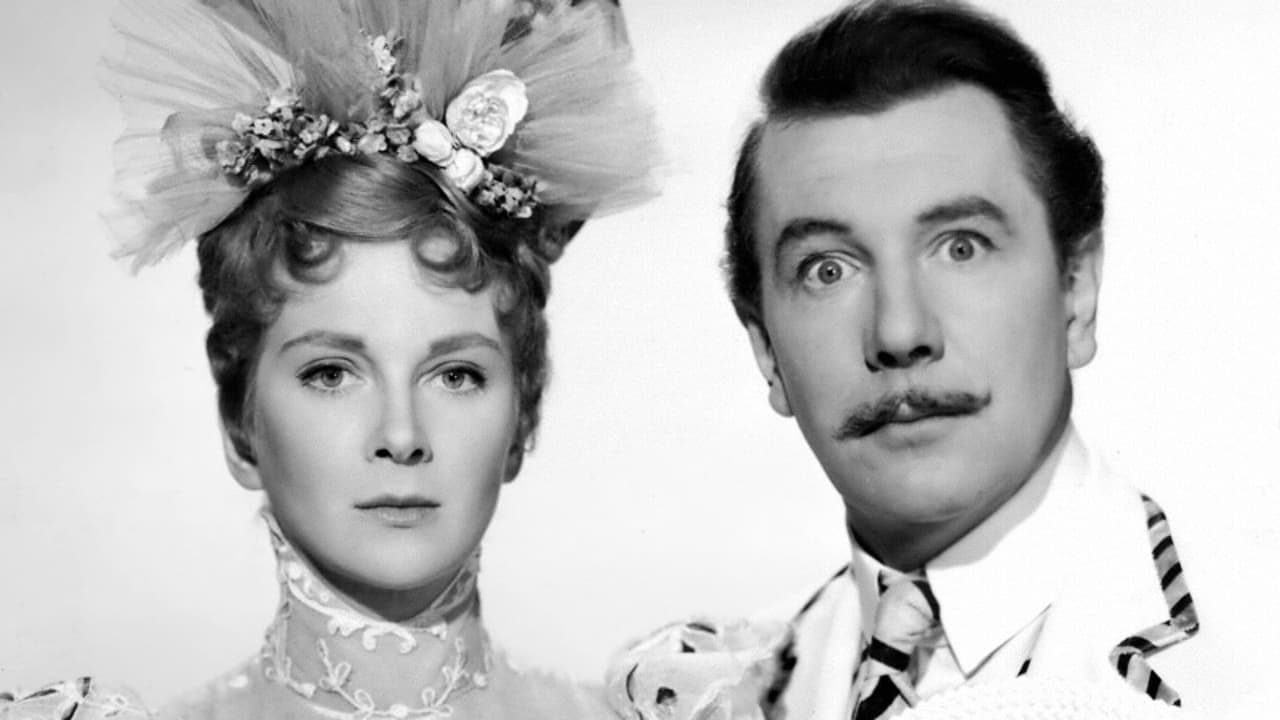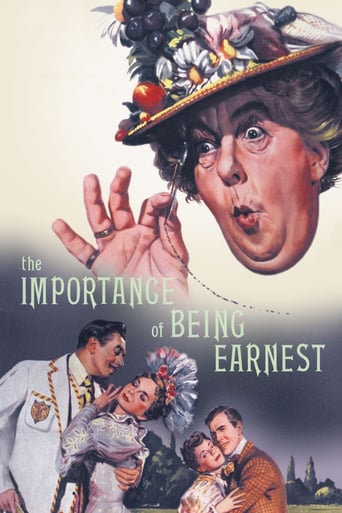

A film with more than the usual spoiler issues. Talking about it in any detail feels akin to handing you a gift-wrapped present and saying, "I hope you like it -- It's a thriller about a diabolical secret experiment."
... View MoreVery good movie overall, highly recommended. Most of the negative reviews don't have any merit and are all pollitically based. Give this movie a chance at least, and it might give you a different perspective.
... View MoreGreat example of an old-fashioned, pure-at-heart escapist event movie that doesn't pretend to be anything that it's not and has boat loads of fun being its own ludicrous self.
... View MoreExactly the movie you think it is, but not the movie you want it to be.
... View MoreDelightful film adaptation of Oscar Wilde's superb play about Victorian-era English manners and mix-ups. The play and performances are so close to Mr. Wilde's original words, you really can't go wrong; although, on close inspection, there are clearly some logistical problems. For example, it is shot beautifully, but without a flourish or imagination worthy of Wilde. And, cameras emphasize things that wouldn't have mattered with the otherwise marvelous cast on stage. To be fair, the film acknowledges this in its execution.Everyone is exemplary, but elderly Aunt Edith Evans really demands to be seen. She possess the role of "Lady Augusta Bracknell" for all eternity, and would be famous for merely uttering the two words "A handbag?" but, every word and phoneme slips sardonically from the mind of Oscar Wilde to dame Edith's tongue. Ms. Evans should have received some "Best Supporting Actress" notice, but this was released in 1952, not 1948, and American voters were favoring homegrown material.Pity.******** The Importance of Being Earnest (6/2/52) Anthony Asquith ~ Michael Redgrave, Michael Denison, Edith Evans, Joan Greenwood
... View MoreThis "Importance of Being Earnest" is a funny movie derived from Oscar Wilde's best play. There are no clunkers in the cast and hardly a wrong step is made, even when Wilde is altered.Dame Edith Evans did not make her stage debut until fifteen years after "Earnest" first premiered, so Oscar Wilde could not have had her in mind when he created the role of Lady Bracknell; but she is so perfect it becomes difficult to imagine anyone else in the part, ever. She manages to squeeze every note of the music of human language into simple words like "found" and "handbag." Margaret Rutherford and Miles Malleson, two famous and prolific actors of the "British dotty school" come very close to being ideal for their more minor parts of (respectfully) Miss Prism and Dr. Chasuble.For the young lovers, the women are well chosen and make a fine contrast. Sultry-voiced Joan Greenwood has had a solid film career to this point (including the Alec Guiness classic "Man in a White Suit") and she knows how to deliver a comic line. Then new-comer Dorthy Tutin is so good with her lines, you'd think she was an old-hand, rather than a fresh-faced, twenty-two year old newcomer making her first major film appearance.The "young men" are sometimes thought of as more problematic. Michael Redgrave (unfortunately known these days more for being the father of Vanessa and Lynn than for his great acting) was in his forties. Mainly stage-bound actor Michael Denison was in his thirties. Denison wonderfully limns the all-important character of Algernon Moncrieff. He's young-looking and exuberant and delivers his lines with great care and consideration (Algernon is an easy character to go hammy with and Denison avoids that trap).For his part, Redgrave compensates for his age by an exquisitely-honed performance. Not only is his delivery spot-on, he practically gives a workshop on how to get a laugh with a slight twitch of a mustache or the roll of an eye. Redgrave and Denison seem to be having a high old time with their roles, while taking them seriously and never overacting.Also, be on the look-out for long-time supporting actor Richard Wattis as "Seton." Blink, and you'll miss him, as he flits in to raise a supercilious eyebrow or two.Some Wilde purists may object to the expurgation of lines. Many of the lines cut are the sort of thing that probably just struck Wilde as "a good idea at the time" and no one will miss them. Other lines may have been cut to keep this movie short, light and frothy. Wilde could be very funny, but he could also be unnecessarily cruel. I don't think he would have been a nice man to know, the way he could sling around hurtful lines to humorous effect. All his characters have been accused of "talking like Wilde" -- which is true to different degrees. A few of the missing lines were genuine, polished gems and it was a pity they weren't included. Also, the sub-plot of Grisby, which only appears in longer versions of the play, does not rear its ugly head in this short version (and good riddance). I, for one, am glad they kept the movie light and without a mean bone in its body.The movie has also been changed subtly from the stage. The stage version has the action taking place on a minimum of sets. The movie remains bound to the sound-stage and never really ventures out of doors (even in the outdoors scenes) but it adds a few more sets and more mobility. For instance, it begins in Jack's flat rather than in Algernon's. For me, this works even better than the stage version and gives Jack a good reason to throw one of Algernon's lines back in his face.So, you have a good play shorn of overmuch dialogue and a solid cast acting their hearts out. I don't know why I call it "Almost Perfect."
... View More"The Importance of Being Earnest" is basically an adaptation of the Oscar Wilde's play for the screen, in other words, a stagy film. Nothing wrong with that, many films succeeded quite well this way, but here the caricatural acting spoils the overall effect. This is a theatrical film with performances that could work well on the stage, aided by the complicity and laughter of an audience. The acting could be even exaggerated if the film were made differently. "The Importance of Being Earnest" should have used fully the possibilities allowed by the play - respectability, social conventions, cynicism, hypocrisy, joie de vivre .... all living together under the same roof. This could have been dynamite if it had been handled right.Unfortunately, the actors are quick in using voices, smiles, eyebrows... to enhance every comic situation - this was not necessary! Oscar Wilde's play needs no underlining. In the "Importance of Being Earnest" there's a crescendo that should be considered. It starts as a light comedy, growing up slowly (innuendos and double entendres contend with respectability) ending finally in an explosion of laughter bursting out of a cathedral of joy. When I read the play as a teenager I liked it a lot - so much, in fact, that I read it again some years ago and I was hoping to repeat the fun with this film. Well, this did not occur. The film is just slightly funny. The story should be treated with the daring and irreverence that were Oscar Wilde's qualities. What we see instead is a "classic" comedy more appropriate perhaps for a museum.
... View MoreDodgson's ChapelI've finally come around to this film of the famous play. The 2002 version wasn't done well and was the subject of one of my very first IMDb comments. The problem there was that the movie tried to be a movie instead of a play, and failed. This one tries only to be a non- distracting film of a play. In fact, I suppose the script is precisely that of the play with no muddling.It works marvelously and in the process becomes more of a workable movie than the later project which tried so hard.I think the reason is simple. The play had a coherent soul. (Oh, how I wonder how rare it is that we have someone that can do this, and what a tragedy that we torture them for being "deviant." Or whether certain types or art demand this on both sides.) That soul is placed in the heart of language, not situation. Its the words that matter, in fact it is the word/name "earnest," and the delicious notion that a baby can be mistaken for a book, in "moment of mental abstraction."Much of the humor or words reflected against contemporary society is based on oblivious extension of phrases and is directly influenced by Lewis Carroll, a somewhat older member of the Oxford community. Its rather wonderful seeing how this meme evolved on the stage, jumping from one clever writer to another until being extinguished by silent films. Its far more interesting than Uranian matters.But we have it here again, unsullied. The speech of Lady Bracknell has to be one of the funniest and sharpest sequence of words ever woven.I should mention a device. The play starts as a play. We see the audience, who looks much like the characters. The curtain goes up and the reality moves to the stage.Ted's Evaluation -- 3 of 3: Worth watching.
... View More